30-Day Study Plan: Accountancy Class 11 | Accountancy Class 11 - Commerce PDF Download
Welcome to the 30-Day Study Plan for Accountancy Class 11! This plan is designed to help you master the CBSE Class 11 Accountancy syllabus, covering Financial Accounting Part I and Part II. Dedicate 2-3 hours daily to follow this plan, and you will be well-prepared for your exams.
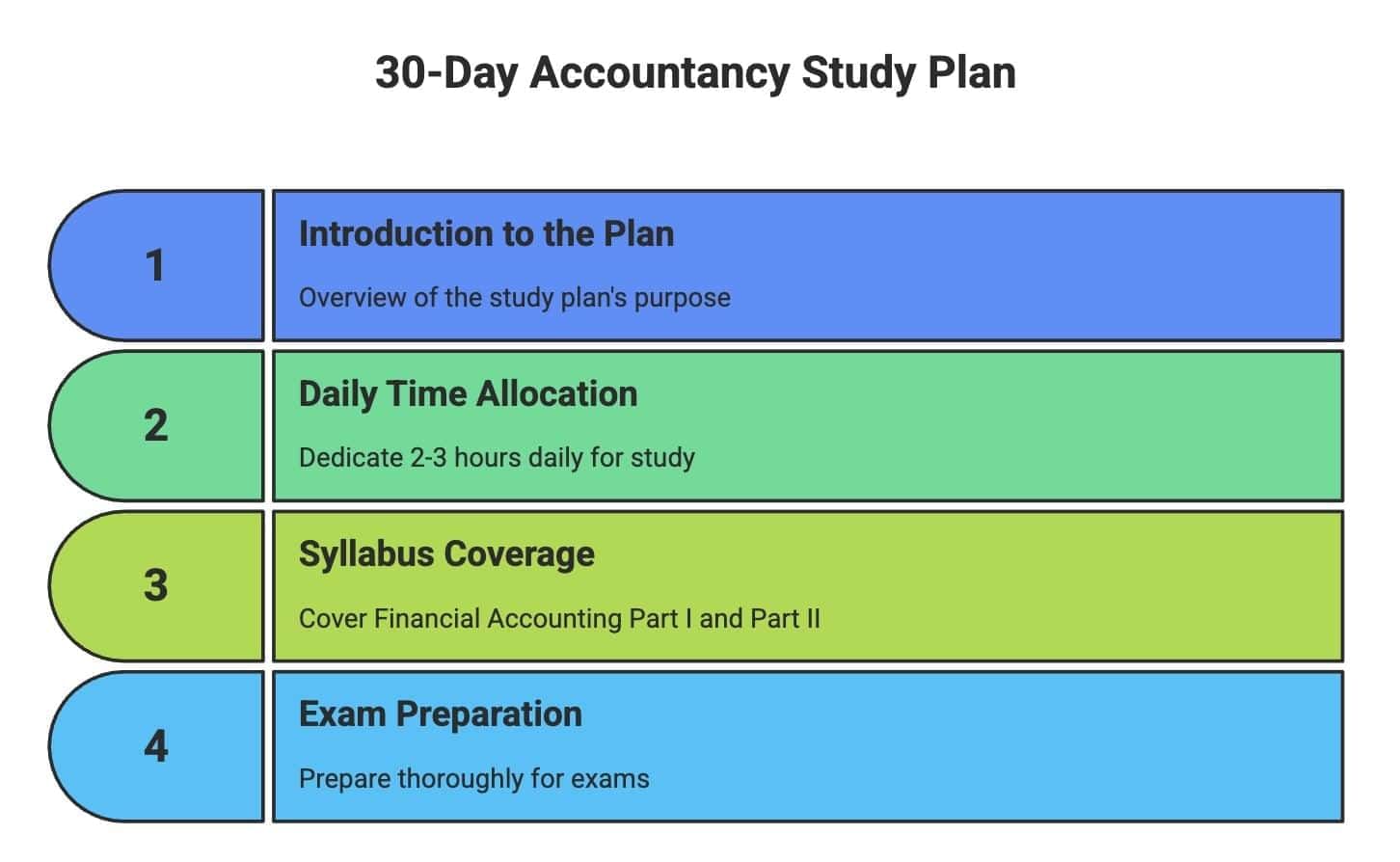
Week 1: Foundations of Accounting
Day 1: Introduction to Accounting
Understand the basics, objectives, and scope of accounting.
- Read: Chapter Notes - Introduction to Accounting
- Watch: Introduction to Accounting
- Task: Create a mind map summarizing key accounting terms using Mind Map: Introduction to Accounting.
- Practice: Attempt Test: Introduction To Accounting - 1
Day 2: Introduction to Accounting (Continued)
Explore users, types, and qualitative characteristics of accounting information.
- Watch: Types of Accounting Information and Qualitative Characteristics
- Read: NCERT Textbook - Introduction to Accounting
- Task: Write a short note on the advantages and disadvantages of accounting.
- Practice: Solve Worksheet: Introduction to Accounting and check Solutions
Day 3: Theory Base of Accounting
Learn about accounting principles and concepts like GAAP and Business Entity.
- Read: Chapter Notes: Theory Base of Accounting
- Watch: What is GAAP? and Business Entity Concept
- Task: Create flashcards for accounting concepts using Flashcards: Theory Base of Accounting.
- Practice: Attempt Test: Theory Base Of Accounting - 1
Day 4: Theory Base of Accounting (Continued)
Study accrual, conservatism, and materiality concepts.
- Watch: Accrual Concept and Conservatism Concept
- Read: NCERT Textbook - Theory Base of Accounting
- Task: Summarize the role of accounting standards.
- Practice: Solve Worksheet: Theory Base of Accounting and check Solutions
Day 5: Recording of Transactions - I
Understand the accounting equation and journal entries.
- Read: Chapter Notes: Recording of Transactions-I
- Watch: What is Accounting Equation? and How to Journalise?
- Task: Solve 5 journal entry problems.
- Practice: Attempt Test: Journal Entries - 1
Day 6: Recording of Transactions - I (Continued)
Learn about source documents and ledger preparation.
- Watch: What are Source Documents? and What is a Ledger?
- Read: NCERT Textbook - Recording of Transactions-I
- Task: Prepare a ledger for 3 transactions.
- Practice: Solve Worksheet: Recording of Transactions - I and check Solutions
Day 7: Revision and Practice Test
Revise concepts from Days 1-6 and assess your understanding.
- Review: Mind Map: Introduction to Accounting and Mind Map: Theory Base of Accounting
- Task: Revise notes and focus on weak areas.
- Practice: Attempt Test: Recording Of Transactions - 1
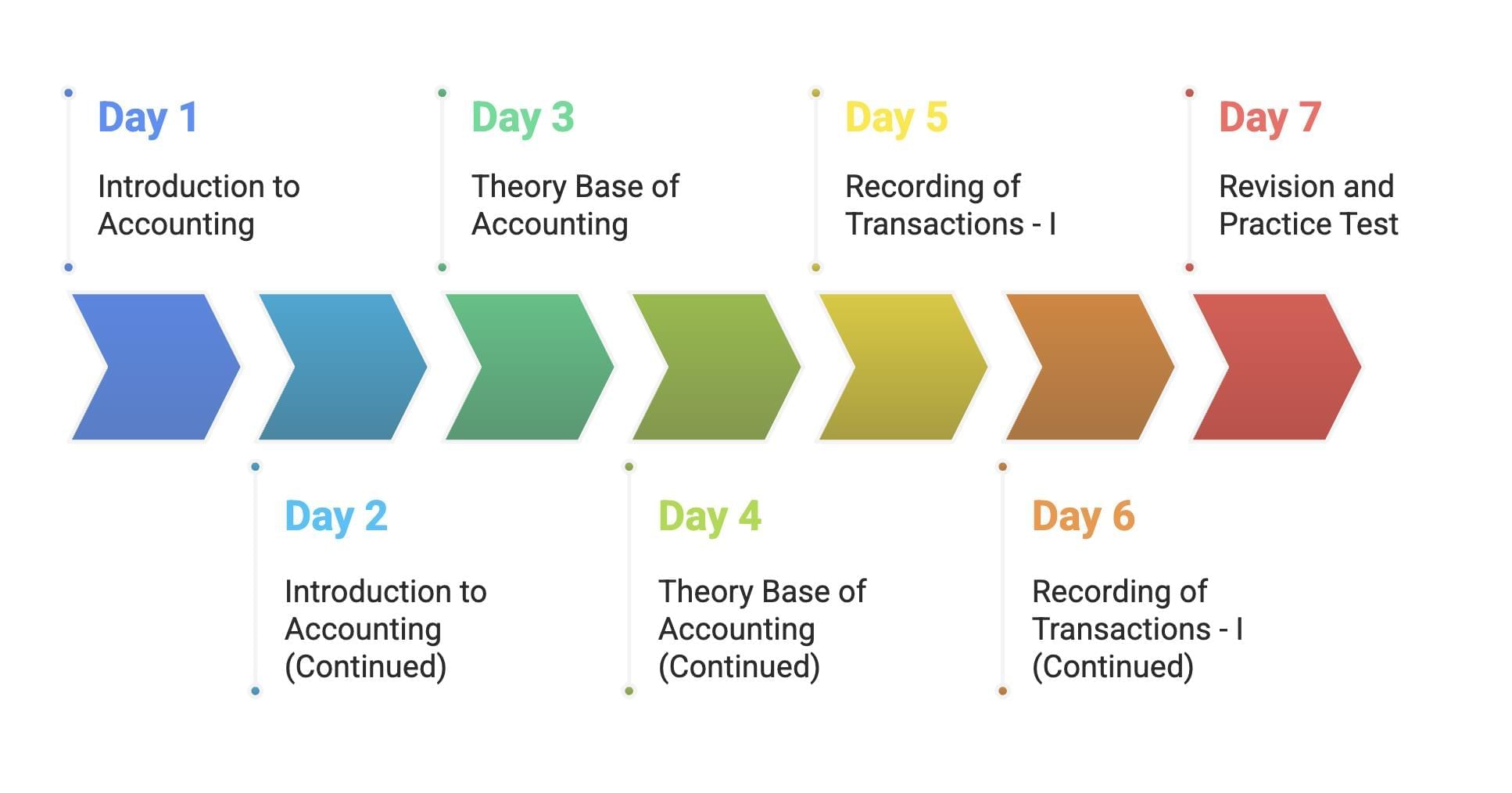
Week 2: Transaction Recording and Subsidiary Books
Day 8: Recording of Transactions - II
Study cash books and balancing accounts.
- Read: Chapter Notes: Recording of Transactions-II
- Watch: Cash Book with Single Column and Balancing the Account
- Task: Prepare a single-column cash book for 5 transactions.
- Practice: Attempt Test: Cash Book - 1
Day 9: Recording of Transactions - II (Continued)
Explore special purpose books like purchase and sales books.
- Read: NCERT Textbook - Recording of Transactions-II
- Watch: Special Purpose Books I - Other Book (Part-1)
- Task: Create a purchase book for 3 transactions.
- Practice: Solve Worksheet: Recording of Transactions - II and check Solutions
Day 10: Bank Reconciliation Statement
Understand the need and preparation of bank reconciliation statements.
- Read: Chapter Notes: Bank Reconciliation Statement
- Watch: Need of Reconciliation and Format of Bank Reconciliation Statement
- Task: Prepare a bank reconciliation statement for a given scenario.
- Practice: Attempt Test: Bank Reconciliation Statement - 1
Day 11: Bank Reconciliation Statement (Continued)
Study differences between cash book and pass book.
- Watch: Distinction between Cash Book and Pass Book
- Read: NCERT Textbook - Bank Reconciliation Statement
- Task: Solve 3 numerical problems on bank reconciliation.
- Practice: Solve Worksheet: Bank Reconciliation Statement and check Solutions
Day 12: Trial Balance and Rectification of Errors
Learn the preparation and objectives of trial balance.
- Read: Chapter Notes: Trial Balance and Rectification of Errors
- Watch: Meaning of Trial Balance and Objectives of Preparing the Trial Balance
- Task: Prepare a trial balance for 5 transactions.
- Practice: Attempt Test: Trial Balance
Day 13: Trial Balance and Rectification of Errors (Continued)
Study types of errors and their rectification.
- Watch: Types of Errors and What is Rectification of Errors?
- Read: NCERT Textbook - Trial Balance and Rectification of Errors
- Task: Rectify 3 errors in a given trial balance.
- Practice: Solve Worksheet: Trial Balance and Rectification of Errors and check Solutions
Day 14: Revision and Practice Test
Revise concepts from Days 8-13 and take a practice test.
- Review: Mind Map: Recording of Transactions II and Mind Map: Bank Reconciliation Statement
- Task: Identify and work on challenging topics
- Practice: Attempt Test: Rectification Of Errors - 1
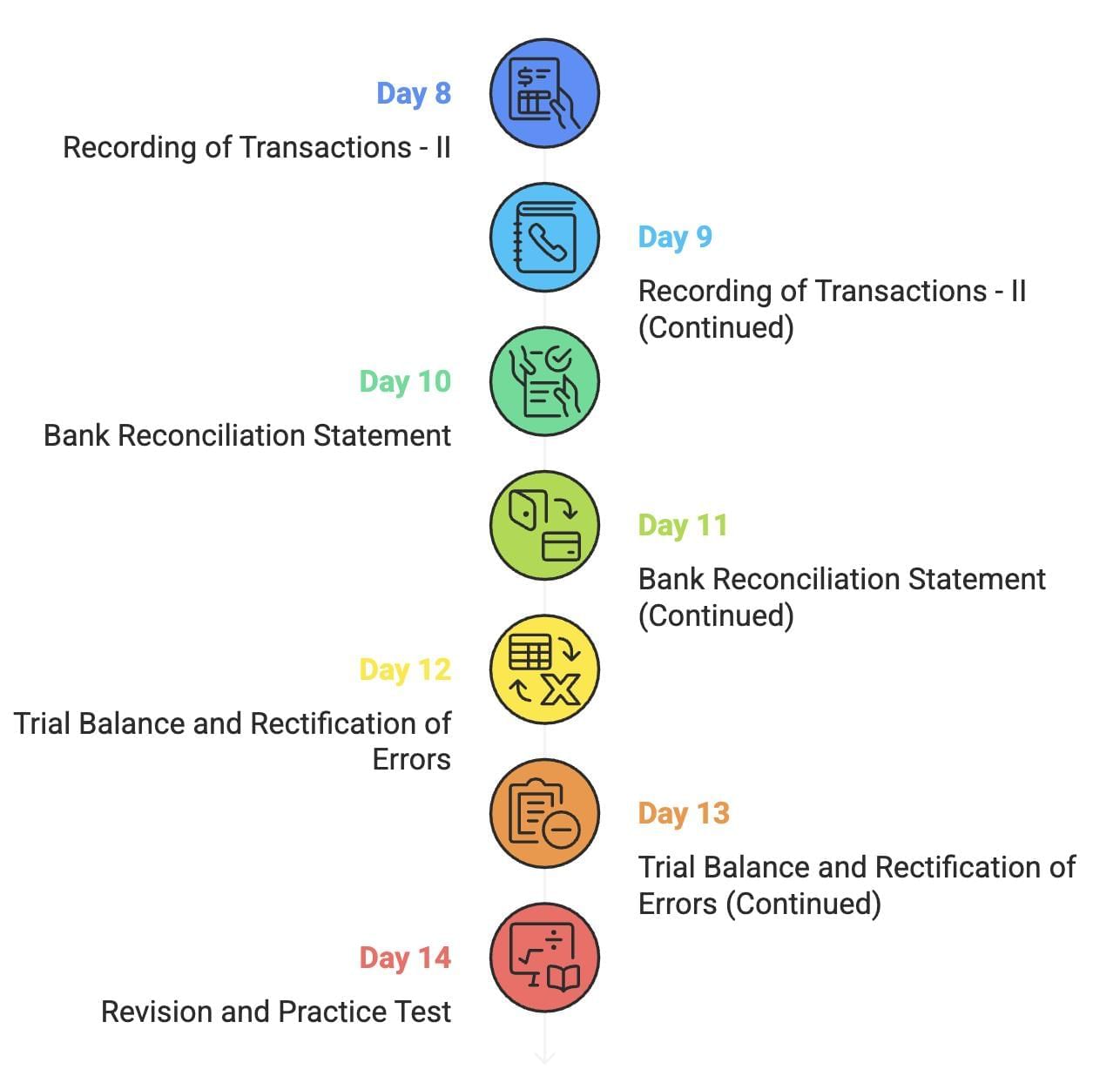
Week 3: Advanced Accounting Concepts
Day 15: Depreciation, Provisions and Reserves
Understand the meaning and causes of depreciation.
- Read: Chapter Notes: Depreciation, Provisions and Reserves
- Watch: Meaning of Depreciation and Causes of Depreciation
- Task: Calculate depreciation using the straight-line method for 2 assets.
- Practice: Attempt Test: Depreciation Provisions And Reserves - 1
Day 16: Depreciation, Provisions and Reserves (Continued)
Study methods of depreciation and types of reserves.
- Watch: Methods of Recording Depreciation and Types of Reserves
- Read: NCERT Textbook - Depreciation, Provisions and Reserves
- Task: Compare straight-line and written-down value methods.
- Practice: Solve Worksheet: Depreciation, Provisions and Reserves and check Solutions
Day 17: Financial Statements - I
Learn about capital and revenue expenditure and basic financial statements.
- Read: Chapter Notes - Financial Statements - I
- Watch: Distinction between Capital and Revenue Expenditure and Financial Statements - 1
- Task: Prepare a trading account for a given dataset.
- Practice: Attempt Test: Financial Statements Of Sole - 1
Day 18: Financial Statements - I (Continued)
Study the preparation of profit and loss account and balance sheet.
- Watch: Financial Statements - 2
- Read: NCERT Textbook - Financial Statements - I
- Task: Prepare a balance sheet for a sole proprietorship.
- Practice: Solve Worksheet: Financial Statements - I and check Solutions
Day 19: Financial Statements - II
Understand adjustments in financial statements like bad debts and depreciation.
- Read: Chapter Notes - Financial Statements - II
- Watch: Bad Debts, Provision for Bad and Doubtful Debt and Adjustment: Depreciation
- Task: Solve 3 adjustment entries for bad debts.
- Practice: Attempt Test: Financial Statements - II
Day 20: Financial Statements - II (Continued)
Study adjustments like closing stock and manager’s commission.
- Watch: Adjusting for Closing Stock and Manager’s Commission
- Read: NCERT Textbook - Financial Statements - II
- Task: Prepare financial statements with 3 adjustments.
- Practice: Solve Worksheet: Financial Statements - II and check Solutions
Day 21: Revision and Practice Test
Revise concepts from Days 15-20 and take a practice test.
- Review: Mind Map: Depreciation Provisions and Reserves and Mind Map: Financial Statements I
- Task: Identify and work on challenging topics.
- Practice: Attempt Test: Financial Statements - 2
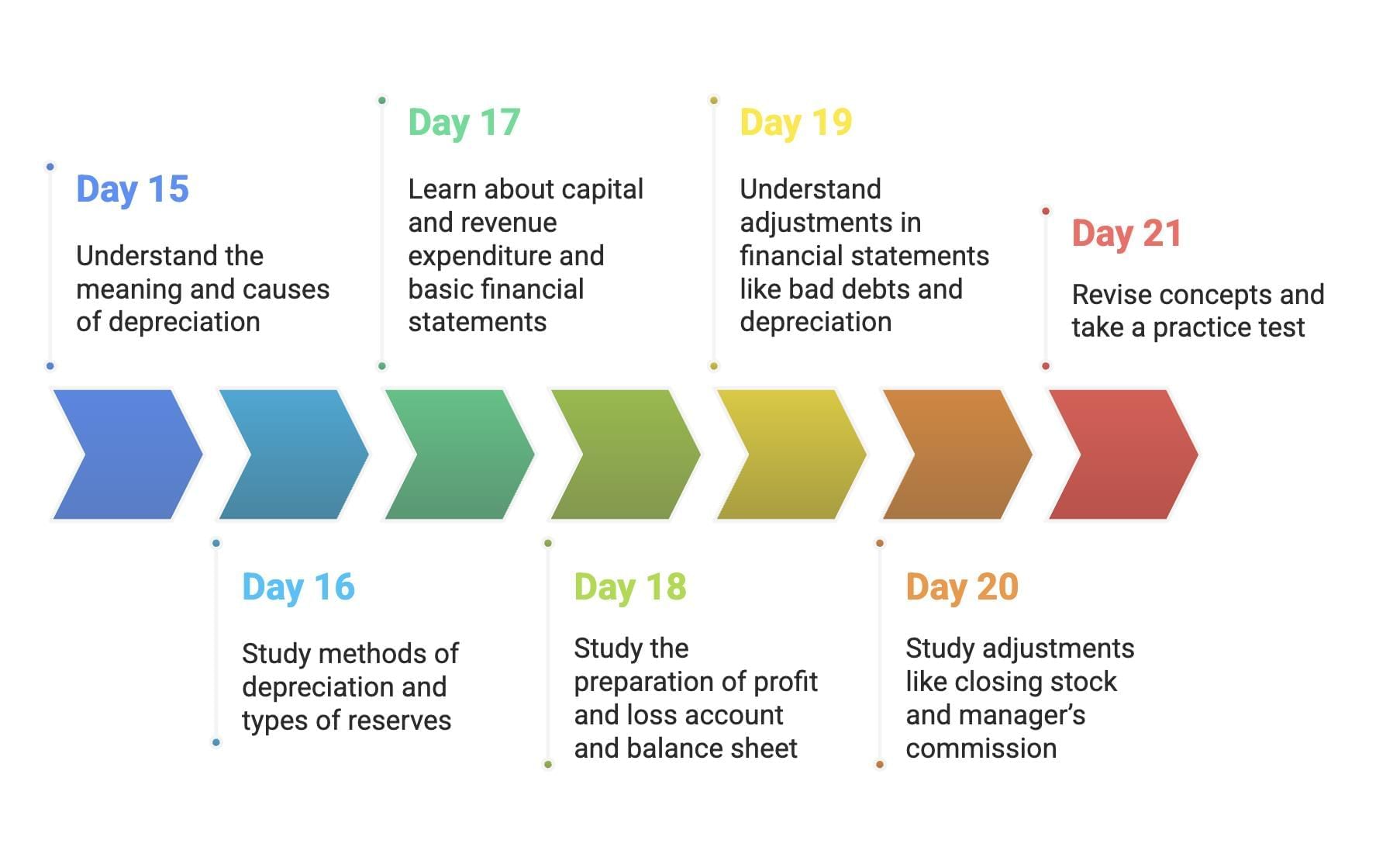
Week 4: Specialized Topics and Exam Preparation
Day 22: Accounting for Bills of Exchange
Learn the basics of bills of exchange and their accounting treatment.
- Read: Accounting for Bills of Exchange (Part - 1)
- Watch: Accounting for Bills of Exchange (Part - 2)
- Task: Journalize 3 bill of exchange transactions.
- Practice: Solve NCERT Solution (Part - 1) - Bills of Exchange
Day 23: Accounting for Bills of Exchange (Continued)
Study dishonor and renewal of bills.
- Watch: Accounting for Bills of Exchange (Part - 3)
- Read: NCERT Textbook - Bills of Exchange
- Task: Solve 3 problems on bill dishonor.
- Practice: Solve NCERT Solution (Part - 3) - Bills of Exchange
Day 24: Accounts from Incomplete Records
Understand single-entry system and its conversion to double-entry.
- Read: Accounts From Incomplete Records Single Entry System (Part - 1)
- Watch: Accounts From Incomplete Records Single Entry System (Part - 2)
- Task: Prepare a statement of affairs for a single-entry system.
- Practice: Solve Accounts From Incomplete Records Single Entry System (Part - 3)
Day 25: Accounts from Incomplete Records (Continued)
Learn to calculate profit under the single-entry system.
- Watch: Accounts From Incomplete Records Single Entry System (Part - 3)
- Task: Solve 2 problems on profit calculation using single-entry.
- Practice: Solve numerical problems from Accounts From Incomplete Records (Part - 1)
Day 26: Revision of Specialized Topics
Revise bills of exchange and incomplete records.
- Review: Accounting for Bills of Exchange (Part - 1) and Accounts From Incomplete Records (Part - 1)
- Task: Summarize key concepts in your own words.
- Practice: Solve mixed problems from NCERT solutions for bills and incomplete records.
Day 27: Previous Year Papers
Practice with previous year CBSE Accountancy papers to understand the exam pattern.
- Solve: Class 11 Accountancy Previous Year Paper - 1
- Solve: Class 11 Accountancy Previous Year Paper - 2
- Task: Analyze mistakes and review related concepts.
Day 28: Previous Year Papers (Continued)
Continue practicing with more previous year papers.
- Solve: Class 11 Accountancy Previous Year Paper - 3
- Solve: Class 11 Accountancy Previous Year Paper - 4
- Task: Time yourself to improve speed and accuracy.
Day 29: Mock Test and Revision
Take a full-length mock test and revise weak areas.
- Solve: Class 11 Accountancy Previous Year Paper - 5
- Task: Revise all mind maps and notes.
- Practice: Focus on numerical problems from financial statements and depreciation.
Day 30: Final Revision and Syllabus Review
Revise all topics and review the syllabus to ensure complete coverage.
- Review: Syllabus: Accountancy for Class 11
- Task: Revise all flashcards and mind maps.
- Practice: Solve mixed questions from Previous Year Questions (PYQs)
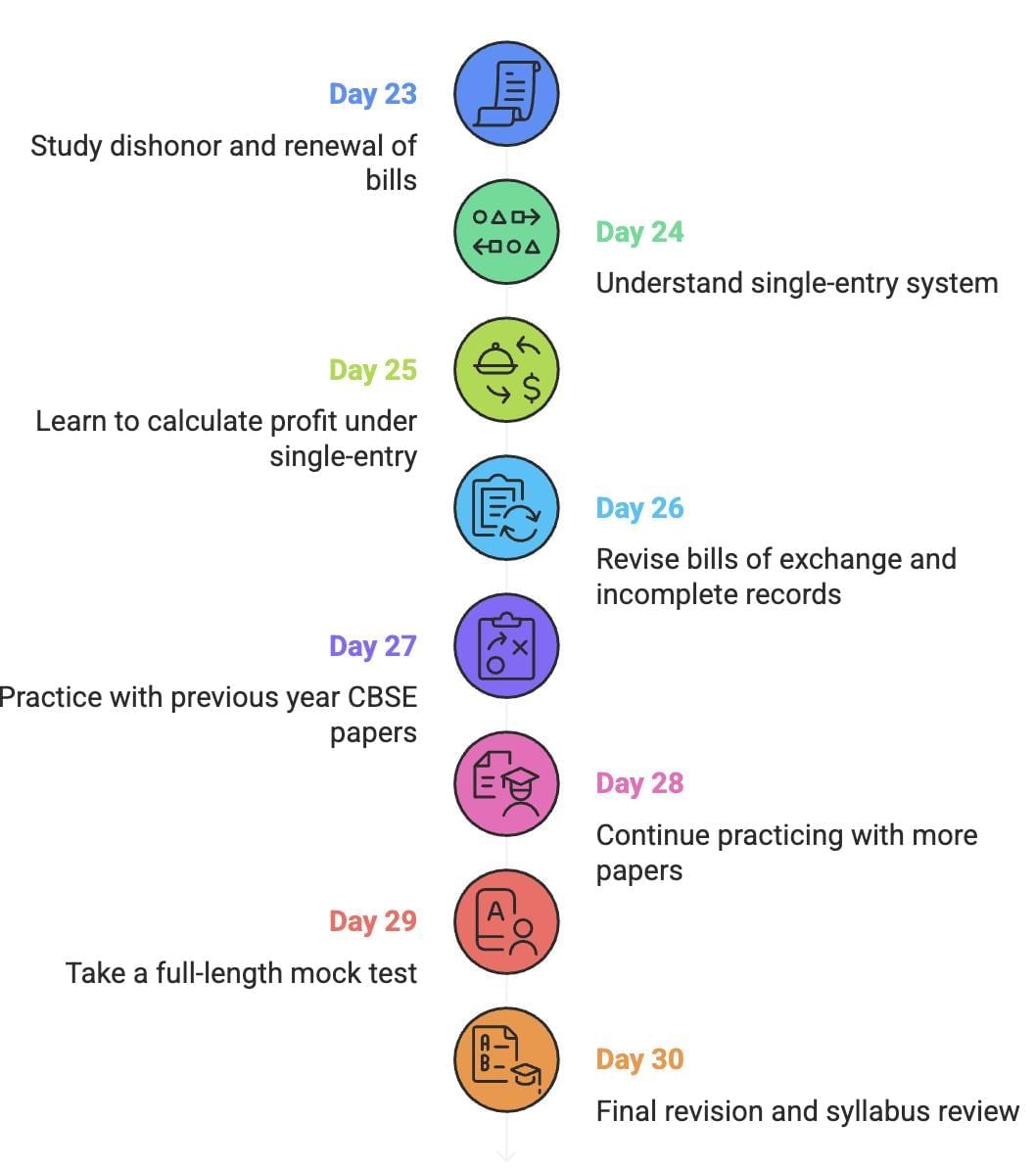
Tips for Effective Preparation
- Stay Consistent: Dedicate 2-3 hours daily and follow the schedule diligently.
- Use Visual Aids: Leverage mind maps and flashcards to reinforce concepts like journal entries and depreciation methods.
- Practice Numericals: Solve worksheets and tests regularly to master accounting calculations.
- Revise Actively: Summarize concepts in your own words and practice past papers to enhance retention.
- Stay Positive: Take short breaks, stay motivated, and maintain a positive mindset to avoid burnout.
|
60 videos|154 docs|35 tests
|
FAQs on 30-Day Study Plan: Accountancy Class 11 - Accountancy Class 11 - Commerce
| 1. What are the basic principles of accounting that students should focus on during their studies? |  |
| 2. How can students effectively record transactions in subsidiary books? |  |
| 3. What advanced accounting concepts should students be aware of for their exams? |  |
| 4. What specialized topics might be included in the syllabus, and how can students prepare for them? |  |
| 5. What are some effective study tips for preparing for an accountancy exam? |  |





















